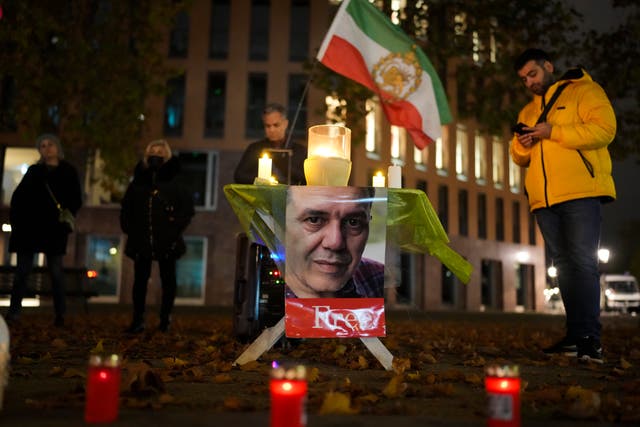Iranian-German prisoner Jamshid Sharmahd executed in Iran over terror conviction
The judiciary’s Mizan news agency reported his execution took place on Monday morning.

Iranian-German prisoner Jamshid Sharmahd, who was kidnapped in Dubai in 2020 by Iranian security forces, has been executed in Iran after being convicted on terror charges disputed by his family, the country’s judiciary reported on Monday.
The judiciary’s Mizan news agency reported his execution took place on Monday morning.
Iran accused Mr Sharmahd, who lived in Glendora, California, of planning a 2008 attack on a mosque that killed 14 people and wounded over 200 others, as well as plotting other assaults through the little-known Kingdom Assembly of Iran and its Tondar militant wing.
Iran also accused Mr Sharmahd of “disclosing classified information” on missile sites of Iran’s paramilitary Revolutionary Guard during a television programme in 2017.
“Without a doubt, the divine promise regarding the supporters of terrorism will be fulfilled, and this is a definite promise,” the judiciary said announcing his execution.
His family disputed the allegations levied against him by the Iranian regime.
They had worked for years to see him freed and are now calling on Tehran to hand his remains over to his loved ones.
Sharmahd’s daughter Gazelle criticised both the US and Germany for failing her father on social media.
She said no proof had been given that indicated that her father had been executed and called for his body to be immediately handed over.
Ms Sharmahd said her family would bury him per Zoroastrian customs if he had, in fact, been executed.
“This must have immediate and unmistakable grave consequences for them now,” she wrote of Iran.
She described the execution of her father as “retaliation of Israeli strikes on the regime.”
Iranian-American activist Masih Alinejad, who US prosecutors say Iran also has tried to kill in the US, praised Sharmahd’s daughter for her advocacy of her father.
“The Islamic Republic understands no language of peace or diplomacy,” Ms Alinejad wrote on X.
“Their language is that of hostage-taking, execution, assassination and murder.”
Mr Sharmahd had been in Dubai in 2020, trying to travel to India for a business deal involving his software company. He was hoping to get a connecting flight despite the ongoing coronavirus pandemic disrupting global travel at the time.
His family received the last message from him on July 28 2020.
It is unclear how the abduction happened but tracking data showed his mobile phone travelled south from Dubai to the city of Al Ain on July 29, crossing the border into Oman and staying overnight near an Islamic school in the border city of al-Buraimi.
On July 30, tracking data showed the mobile phone travelled to the Omani port city of Sohar, where the signal stopped.
Two days later, Iran announced it had captured Mr Sharmahd in a “complex operation”. The Intelligence Ministry published a photograph of him blindfolded.
Germany expelled two Iranian diplomats in 2023 over Mr Sharmahd’s death sentence. The US State Department has referred to Iran’s treatment of Mr Sharmahd as “reprehensible” and described him as facing a “sham trial”.
“We have long made clear that we oppose the way Iran carries out executions, often in a way that fundamentally violates human rights,” State Department spokesman Matthew Miller said on Monday.
German foreign minister Annalena Baerbock condemned “the murder of Jamshid Sharmahd by the Iranian regime in the strongest possible terms”.

Mr Sharmahd “was abducted to Iran from Dubai, held for years without a fair trial and has now been killed”, she said in a statement.
“We made it crystal clear to Tehran time and again that the execution of a German national would have severe consequences,” Ms Baerbock said. She did not elaborate on what those might be.
Amnesty International said the proceedings against Mr Sharmahd had been a “grossly unfair trial” because he had been denied access to an independent lawyer and “the right to defend himself”.
“The government-appointed lawyer said that without payment of 250,000 dollars (£192,598) from the family, he would not defend Jamshid Sharmahd in court and would only ‘sit there’,” Amnesty said in one report on his case.
However, Amnesty noted that Mr Sharmahd ran a website for the Kingdom Assembly of Iran and its Tondar militant wing that included claims of “responsibility for explosions inside Iran”, though he repeatedly denied being involved in the attacks.
Mr Sharmahd had been targeted by Iran prior to his kidnapping. A 2010 US diplomatic cable released by WikiLeaks identified Mr Sharmahd as having been targeted by Iran in California, with an operative trying to hire a hitman to kill him.
“It marks a clear escalation in the regime’s attempts to intimidate critics outside its borders, and could have a chilling effect on journalists, academics and others in the West who until recently felt little physical threat from the regime,” the cable read.





